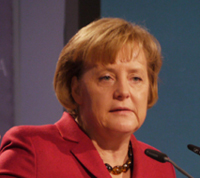Politics
German-French push for the financial-transactions tax
 The debate over the tax on financial transactions known since 1972 as the Tobin tax was re-ignited by the banking crisis of 2008. The taxation of financial transactions, such as trading in shares, currencies or bonds or other securities, is seen as a way to curb speculation in the markets and make the financial sector contribute to the costs of the financial crisis. In the wake of the recent debt crisis in Europe, Chancellor Angela Merkel (CDU) and French President Nicholas Sarkozy agreed at their bilateral meeting in mid-August that for them the tax was a top priority and should be introduced at least in Europe. For September, the two leaders have announced a joint text. Meanwhile, German Finance Minister Wolfgang Schäuble (CDU) is already counting on the revenue from a tax on financial transactions as from 2012. It is earmarked in the federal budget at an annual total of two billion euros. According to calculations, at a tax rate of 0.01-0.05 per cent the tax could bring in between 10 and 20 billion euros annually in Germany alone.
The debate over the tax on financial transactions known since 1972 as the Tobin tax was re-ignited by the banking crisis of 2008. The taxation of financial transactions, such as trading in shares, currencies or bonds or other securities, is seen as a way to curb speculation in the markets and make the financial sector contribute to the costs of the financial crisis. In the wake of the recent debt crisis in Europe, Chancellor Angela Merkel (CDU) and French President Nicholas Sarkozy agreed at their bilateral meeting in mid-August that for them the tax was a top priority and should be introduced at least in Europe. For September, the two leaders have announced a joint text. Meanwhile, German Finance Minister Wolfgang Schäuble (CDU) is already counting on the revenue from a tax on financial transactions as from 2012. It is earmarked in the federal budget at an annual total of two billion euros. According to calculations, at a tax rate of 0.01-0.05 per cent the tax could bring in between 10 and 20 billion euros annually in Germany alone.
But the Franco-German effort is ambitious. Firstly, all EU countries must agree to the introduction: in Europe the unanimity principle applies in tax matters. Secondly, Britain is vehemently against this tax. The British fear that the tax could harm the City of London by making the banking sector move to countries without such a tax. A restriction to the eurozone is, however, regarded by experts as pointless. Now the EU Commission too has announced a draft law introducing the tax for the autumn. Meanwhile, shareholder associations are critical. Germany’s DSW warns that the introduction of the levy would further impair the country’s equity culture and through the already burdened financial intermediaries put a further strain of indirect taxes on their customers. Once again private investors were being asked to pay, said general manager Ulrich Hocker. Deutsche Bank chief Josef Ackermann also warned that the German and French plans were problematic. The tax would make it hard for banks in the eurozone to be profitable, and they would be forced to relocate their activities to other countries. The Federal Association of German Banks (BdB) criticized the initiative, as the introduction of the tax was not an element for stabilizing the currency union. The German Savings Banks and Giro Association (DSGV), however, advocates the tax as a proper measure for more stability. The financial transaction tax was already on the agenda of the G20 meeting of Heads of State and Government in the autumn of 2009, but could not be resolved there.
Hedge funds betting against German stocks
 While in Germany a broader ban on short selling is not in sight, the temporary bans on short selling which France, Spain and Italy imposed for financial stocks led to losses and declines in share prices in this country which went well beyond those for other indices in the euro area. As is evident from figures from Data Explorers, bets on declining prices of banking and financial stocks in Germany, Britain and the U.S. are the speculators’ new strategy. According to the data from the British provider, the proportion of borrowed shares in German financial stocks has risen by 31 percent since mid-August. Market participants have moved to DAX futures, because the short-selling bans contained in the Securities Trading Act do not affect the futures market. There were still no plans for such a ban, a spokesman for the Federal Finance Ministry said on 25 August.
While in Germany a broader ban on short selling is not in sight, the temporary bans on short selling which France, Spain and Italy imposed for financial stocks led to losses and declines in share prices in this country which went well beyond those for other indices in the euro area. As is evident from figures from Data Explorers, bets on declining prices of banking and financial stocks in Germany, Britain and the U.S. are the speculators’ new strategy. According to the data from the British provider, the proportion of borrowed shares in German financial stocks has risen by 31 percent since mid-August. Market participants have moved to DAX futures, because the short-selling bans contained in the Securities Trading Act do not affect the futures market. There were still no plans for such a ban, a spokesman for the Federal Finance Ministry said on 25 August.















